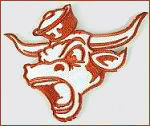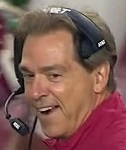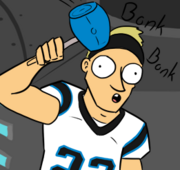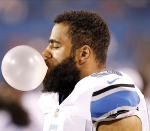|
Let's laugh at a high school kid, everyone. Everyone laugh at the high school kid. 21 seconds. http://foxct.com/2014/10/31/high-school-football-highlights-berlin-continues-undefeated-streak/
|
|
|
|

|
| # ? May 14, 2024 00:42 |
|
FreakyMetalKid posted:If it can't be quantified, it may still exist, that's fair. However, if there's not a correlation between long drives and points or long drives and wins, then it's probably not a factor worth yapping about so frequently. Yeah but the Oregons, A&Ms and Baylors of this world tend to prove the point more than refute it. They win by getting a lot of possessions and scoring quickly on a high percentage of those possessions, but almost every one of them has a subpar defense. Because a defense that's on the field all the time just can't be nasty the way a defense can be if they only need to come in and destroy for like 10 plays per quarter. Now obviously there are lots of defenses that can't do that under the best of circumstances, but if you want to have your team's identity built around super effective defense you have to dominate time of possession. Also the hurryup thing is a way to exploit the tired defense factor in a short period of time by snapping the ball rapidly and making the D run a lot of plays quickly without substituting. When a hurryup team is rolling you start to see defenders with their hands on their knees in a single drive, while the offense is still cruising. Thermos H Christ fucked around with this message at 15:30 on Nov 7, 2014 |
|
|
|
FreakyMetalKid posted:If it can't be quantified, it may still exist, that's fair. However, if there's not a correlation between long drives and points or long drives and wins, then it's probably not a factor worth yapping about so frequently. TOP is determined more by play style (and a good defense) than quality of offense. The service academies always have the ball a ridiculous amount because they run on every single play and they try to shorten the game against their athletically superior opponents.
|
|
|
|
Trin Tragula posted:Let's laugh at a high school kid, everyone. Everyone laugh at the high school kid. 21 seconds. We had an athletic guy who didn't know how to play soccer sub in as goalie for our college intramural team once. He made a great save on a PK late in the second half and then he spiked the ball in triumph. (Time froze and then like half of each team was under the ball as it came down... it would be a better story if the other team scored but after a mad scramble and some pinball the ball was cleared.)
|
|
|
|
Smart Football just posted a really nice glossary of football terminology that might be helpful to some 1st Downies out there.
|
|
|
|
Rooster Brooster posted:Smart Football just posted a really nice glossary of football terminology that might be helpful to some 1st Downies out there. I'm trying to figure out, like on a scale of 1-10, how dumb I am. I've been playing Madden Football for 5-6 years and I only knew (or at least had somewhat of an idea) about 10% of that stuff. Do most of the people posting in the gameday threads know all this stuff and I just have some sort of learning disability?
|
|
|
|
SkunkDuster posted:I'm trying to figure out, like on a scale of 1-10, how dumb I am. I've been playing Madden Football for 5-6 years and I only knew (or at least had somewhat of an idea) about 10% of that stuff. Do most of the people posting in the gameday threads know all this stuff and I just have some sort of learning disability? Part of the problem is that a lot of those terms are specific to a particular offense or coach or style. The same formations and concepts get called a dozen different things depending on what team you're dealing with. I've learned a lot of that stuff by reading Brian Cook's UFR (Under Further Review) breakdowns of Michigan games at MGoBlog. There was still a good fraction of those that I was hazy on. I'm still learning zone defenses and player assignments, in particular.
|
|
|
|
Yeah I definitely wouldn't worry too much that everyone in GDTs knows more than you if you didn't already have all of that down, if you know what a pistol is and can recognize a read option you're fine, if you can identify gaps you're probably ahead of the crowd. I am a little curious as to what people pick up learning the game from Madden as opposed to playing it, even at the lovely high school level I did. It hit me reading the trap entry that it's something everyone who's played on either side of the line would know. Both since it's a pretty common play and more importantly because if the defender doesn't feel it coming when he's seemingly left alone he's getting blown the hell up. But I don't see any reason you'd need to actually understand the mechanics of the play in Madden (I could be wrong, I haven't played Madden in years and never thought about it before). On the other hand you might have been more familiar with stuff I had to read up on because we didn't run it/it wasn't my job. Grittybeard fucked around with this message at 05:54 on Nov 13, 2014 |
|
|
|
The early Madden manuals (when it was still John Madden Football, yes I read manuals) actually had in them a fantastically evocative description of a trap play.quote:*TRAP* Don't you just love that?
|
|
|
|
Trin Tragula posted:The early Madden manuals (when it was still John Madden Football, yes I read manuals) actually had in them a fantastically evocative description of a trap play. I sometimes run twenty OL trap plays in a row just to watch the same defender eat poo poo over and over.
|
|
|
Mel Mudkiper posted:I sometimes run twenty OL trap plays in a row just to watch the same defender eat poo poo over and over. if you call hail mary and audible to 0 1 trap you will make 10yds against the cpu like every single time my personal favorite move though is whenever i need 2 yds or a 2pt conversion with Russell, qb sneak and the moment you snap it, hurdle forward and surf your o-line into the end zone
|
|
|
|
|
SkunkDuster posted:I'm trying to figure out, like on a scale of 1-10, how dumb I am. I've been playing Madden Football for 5-6 years and I only knew (or at least had somewhat of an idea) about 10% of that stuff. Do most of the people posting in the gameday threads know all this stuff and I just have some sort of learning disability? Yeah, I doubt most GDT posters would be able to pass a quiz on those terms or anything. They're just good to know if you're reading any other analysis on a game/team/player. I did know enough to chuckle at this part: quote:Tampa Two: The actual definition of Tampa Two is that it is a hybrid pass coverage popularized by Tony Dungy and Monte Kiffin with the Tampa Bay Buccaneers where the defense aligns as if to play a traditional two-deep or “Cover 2″ Zone but in fact drops the middle linebacker deep down the middle to a depth of 18-22 yards, thus transforming the defense into a type of three-deep zone. The definition you will hear more commonly, however, is that every defense coached by Tony Dungy, Lovie Smith or Monte Kiffin is Tampa Two.
|
|
|
|
Are there limits on the amount teams can spend on coaches, trainers, consultants, etc, both in $ and the amount of personnel they can hire? What about NFL and NCAA?
|
|
|
|
Coaches/personnel aren't counted against the salary cap so I believe it's just up to whatever the owner is willing to shell out.
|
|
|
|
This got buried so I'll ask again:Henchman of Santa posted:What's the point of eligibility rules for college teams in transition between divisions? Georgia Southern is 7-2 playing a full FBS schedule, but they can't count as a Sun Belt champion or even make a bowl game unless there aren't enough eligible teams. That seems really dumb.
|
|
|
|
OperaMouse posted:Are there limits on the amount teams can spend on coaches, trainers, consultants, etc, both in $ and the amount of personnel they can hire? A college can theoretically spend all the money if they wanted to, but they can only have 13 total coaches: 1 head coach, 9 assistant coaches, 2 graduate assistants, and a S&C coach. Virtually everyone does two or three tasks, as a result. The rules also mention that you can have limitless undergraduate coaches, but I have no idea what that actually means. This is FBS, though. Other levels have other rules.
|
|
|
|
Sash! posted:A college can theoretically spend all the money if they wanted to, but they can only have 13 total coaches: 1 head coach, 9 assistant coaches, 2 graduate assistants, and a S&C coach. Virtually everyone does two or three tasks, as a result. The rules also mention that you can have limitless undergraduate coaches, but I have no idea what that actually means. I think the service academies get like two extra coaches or something.
|
|
|
Sash! posted:A college can theoretically spend all the money if they wanted to, but they can only have 13 total coaches: 1 head coach, 9 assistant coaches, 2 graduate assistants, and a S&C coach. Virtually everyone does two or three tasks, as a result. The rules also mention that you can have limitless undergraduate coaches, but I have no idea what that actually means. I didn't know there was a limit to GAs, I guess I assumed the dozens of supplemental coaching staff I see on the practice field and sidelines were all GAs but they must be undergrads if that's true. Huh.
|
|
|
|
|
Sash! posted:A college can theoretically spend all the money if they wanted to, but they can only have 13 total coaches: 1 head coach, 9 assistant coaches, 2 graduate assistants, and a S&C coach. Virtually everyone does two or three tasks, as a result. The rules also mention that you can have limitless undergraduate coaches, but I have no idea what that actually means. Rookie thread. What's a S&C coach? Strength and conditioning (fitness) coach?
|
|
|
Iron_Chef posted:Rookie thread. What's a S&C coach? Strength and conditioning (fitness) coach? yes, and here's the best S&C coach video you will ever see. gently caress bama forever but this guy freakin rules https://www.youtube.com/watch?v=9WZd6AyDZFs
|
|
|
|
|
wheez the roux posted:yes, and here's the best S&C coach video you will ever see. gently caress bama forever but this guy freakin rules I feel compelled to exercise now... Watching the video prompted these tangentially related thoughts. I understand that the NCAA is in place supposedly to protect the US college players but I've heard a lot about how the NCAA is raking in the cash almost at the expense of the players. Is this perceived in general as the elephant in the room it appears? Why hasn't there been a player revolt? Is it the NCAA and the colleges making all the money?
|
|
|
|
Iron_Chef posted:I feel compelled to exercise now... Not to open up too big of a Athletics began as an extra-curricular activity the students organized and ran themselves. About 1885 they discovered that the public would pay good money to watch them play football, and they decided to use football money to pay for other sports. When things started to get out of hand, the faculties took over and grafted the athletic departments onto the university proper. It all developed rather ad-hoc without much planning, and what we have is a rather odd hybrid system. There are a lot of reforms that are needed, and which reforms are adopted will determine what direction American college athletics goes in the future.
|
|
|
|
The NCAA also has $100 million in "management" costs and 60 mil in surplus. The cartel is making itself money.
|
|
|
|
$71 million is very little, when you're practically bringing in close to a billion a year and then spending it on...whatever they spend money on. Although my perception of big amounts of money has been permanently distorted after working on NASA's budget for the last three years. We put the decimal point at "million."
|
|
|
Iron_Chef posted:I feel compelled to exercise now... the NCAA is a huge piece of poo poo of an organization and full of as much corruption and exploitation as an org their size can muster. not FIFA or IOC bad, but that's only because those orgs are so much bigger and not for any lack of trying. no one worth a drat has a positive overall view of the NCAA or their hypocritical bullshit stance on player compensation and with any luck they'll be cleaned out by lawsuits
|
|
|
|
|
Henchman of Santa posted:This got buried so I'll ask again: I'm not ignoring this, I don't know the actual answer. I'll offer an educated guess, however. Having such restrictions in place makes it infeasible to move up and down divisions regularly. My best guess as to why they would want to do this is to prevent teams from abusing the scholarship limitation rules in the different divisions. For example, if there was no penalty, I could see an FCS school declare for FBS, play a couple years at that level and sign the full complement of 85 scholarships, then drop back down to FCS and cull the 22 worst scholarship players to get back down to the limit of 63 for them. Then they could clean up in FCS with their superior players. Lather, rinse, repeat.
|
|
|
|
Deteriorata posted:I'm not ignoring this, I don't know the actual answer. I'll offer an educated guess, however. It's not really specific to football, but in recent years the NCAA has restricted upward divisional movement (particularly into Division I), with more requirements on schools wishing to move up and most recently a requirement that a conference sponsor the move. This seems to have been in response to the instability/directionlessness of a number of programs that made the jump from the late '90s or so onward—look up Morris Brown for probably the most extreme example of things going wrong (though admittedly for reasons not directly relating to the athletic department). It's also worth noting in the context of FCS-to-FBS moves that situations like Georgia Southern's are really rare—teams making the move usually get shithoused for the first few seasons (cf. Georgia State's 1-21 and counting record starting in 2013, UMass's 5-29 and counting record starting in 2012, South Alabama's 2-11 record in 2012, WKU's 4-32 record in '08-'10, FIU's 1-23 record in '06-'07, etc.).
|
|
|
|
I haven't watched RG3 play since his rookie season so I'm curious: Is his massive decline entirely a result of his rookie year playoff injury or was he also severely over-rated?
|
|
|
|
Lazerbeam posted:I haven't watched RG3 play since his rookie season so I'm curious: Is his massive decline entirely a result of his rookie year playoff injury or was he also severely over-rated? It's hard to call what he did the product of a system or him having inflated stats because a player has to have some strengths to be accentuated. Fact is though his mobility and ability to throw on the run and carry the ball on designed and broken plays helped his development. Shanahan had run offenses for over a decade using guys like Cutler, Elway and Plummer who could run and had good arms so he knew the best way to bring his strengths to the forefront. I would argue that his rookie injury derailed everything in between his rookie season and this past year. That being said it's a little hard to give him all the blame. Not being able to prepare for the season like everyone else with a new head coach and offensive system has hindered his development. The offensive line isn't great and he's going to be a little gunshy after being off the field for so long, but he should be playing better. He's not a terrible quarterback dragging down a good team, he's a formerly great-looking quarterback playing badly on an average team. My gut feeling is that if the coaching staff and personnel simply chill the gently caress out and go through the offseason programs correctly we'll see him drastically improve next year. If they yank him in favour of McCoy and start firing coaches they're never going to get anywhere. He's still a little banged up, hasn't had the reps or experience in the system to flourish and doesn't have an amazing supporting cast (at least along the line). He might well never be the same guy, but really I think they need to keep him around for another year and see how he goes healthy with a full training camp under his belt. BlindSite fucked around with this message at 04:24 on Nov 26, 2014 |
|
|
|
Hey, I was directed towards this thread from the GDT for my questions. How does defending the pass differ from defending a run? Do teams "specialize" in a run or pass defense or will a defensive team be good at defending overall? For context, NBC was touting Seattle vs San Francisco as a defensive game. I was wondering if they were different kinds of defense. Aside from home crowd, how much of a home field advantage is there? Am I right in thinking that running plays are for relatively safe yet low yardage, while passing is for longer yardage but might be riskier? For context, a team ran the ball on 3 and 20 and a poster called that very dumb. I thought that runs and plays were alternated to keep the other team on their toes. E: what's the deal with the coaches' walkie talkies? I would assume it's at LEAST frowned upon to listen in on an opposing team's radio? E2: Like the NBA or NHL, is there a weak east or west? Or more likely, is the NFC or AFC weak? Weak divisions? Like the southeast division of the NHL was absolutely laughable with the Washington Capitals as perennial kings of the poo poo pile. The east is generally considered weak in the NBA (i think) and NHL (i know) Rotten Cookies fucked around with this message at 04:06 on Nov 28, 2014 |
|
|
|
Rotten Cookies posted:Hey, I was directed towards this thread from the GDT for my questions. Defending a run involves different actions and strategies than defending a pass. It's hard to do both simultaneously so offenses try to disguise what they're doing and get defenses out of position. The various assignments and strategies for each are too complicated to go into in much a short post. In a nutshell, defending the line means holding the line of scrimmage, with the ends setting the edge and turning the play back inward, while linebackers plug holes that runners may come through. Defending a pass requires keeping receivers covered and rushing the quarterback to make him throw before he's ready. Teams do tend to specialize in one type more than the other. Some of it is due to the philosophy of the coach, some is due to the limitations on the abilities of the players. Every defense wants to stop everything, of course, but are naturally going to be better at some things than others. Your assessment of running versus passing is basically correct. Running plays rarely gain or lose a lot (although a well-designed running attack can gain lots of yards), while with passing you can gain a lot of yards in a hurry on a completion, but you run the risks of interceptions and sacks. As far as running the ball on 3rd and 20, a lot of TFF posters seem think this is dumb but it is not. Very few plays are going to net 20 yards and those that do are high risk. The defense is also ready for a long pass, which adds to the risk. Unless you're in a situation where you have to try it (like behind late in the game), it is far more prudent to give up the series and punt the ball - the odds of making the first down are low and the odds of turning it over are high. Let your defense get the ball back and try again the next drive. E: Coaches walkie-talkies are for communicating with each other, particularly with coaches watching from the press box. They are prohibited from listening in on the other team's communications.
|
|
|
|
Deteriorata posted:Defending a run involves different actions and strategies than defending a pass. It's hard to do both simultaneously so offenses try to disguise what they're doing and get defenses out of position. Are there any convenient links for assignments and strategies you (or anyone else) could post? Are there "hybrid" or "fake" defenses that look like they're defneding pass but are actually going to defend a run? For further questions, are there generalizations about divisions/conferences? I hate bringing it back to the NHL, but it's what I know.(historically and generally) The west is generally considered to have stronger and faster teams, playing a more "north-south" game. While the east is weaker and plays a slower, east-west game. Whether you buy into those things or not, I have to imagine those things exist in the NFL. Is the AFC east a big running division? Does any division have a lot of hurry-up offense or anything? I guess, if you had to give each division a one or two word description, what would it be? Can they be generalized like that? Rotten Cookies fucked around with this message at 04:35 on Nov 28, 2014 |
|
|
|
Rotten Cookies posted:
You could probably generalize about the quality of a division or conference over the span of a few years, but not style. Double edit: If you're really into conference or regional identity expressed through play style, get into college ball. Which you should do anyway because it rules harder than anything on earth. Henchman of Santa fucked around with this message at 05:16 on Nov 28, 2014 |
|
|
|
Rotten Cookies posted:Are there any convenient links for assignments and strategies you (or anyone else) could post? Are there "hybrid" or "fake" defenses that look like they're defneding pass but are actually going to defend a run? Be warned: defense is really really complicated. It will take you a very long time to understand all of what's going on. There are basic concepts that are universal and fairly straightforward, but there are dozens of different formations and philosophies in actual practice and it all gets out of hand pretty quickly. Here's a couple places to start that might help: http://www.dummies.com/how-to/sports-outdoors/football/Football-Defense.html http://subscribers.footballguys.com/2009/09bramel_idpguide.php
|
|
|
|
Its hard to categorize entire divisions, but some do have trends that last a while, but that is usually because of one or two teams becoming very good. For instance, you can summarize the AFC East in two words as Pat's Win. The AFC North is categorized by the Ravens/Steelers rivalry for the past decade. The AFC West is lol Raiders. One other important point about run vs. pass distinction is the effect on the play clock, especially at the end of the game. The clock will stop running when a player goes out of bounds, or on an incomplete pass. That's why in the two minute drill, you almost always see passing plays. That is also the point of the "prevent defense". You give up the middle of the field for a completion with the goal of tackling the ball carrier in bounds and making the clock run. People complain about that defense a lot because it seems a lot of teams use it and it backfires. Its a perfectly good defense and strategy, its just that teams don't employ it properly, doing so with too much time on the clock, or against a team with a full allotment of time outs. The best way to use the prevent defense is when the offense needs a TD, not a FG to win/tie. They should have at most one timeout, and less than 90 seconds on the game clock, and most importantly a quarterback named something other than Brady, Manning, or Rodgers.
|
|
|
|
Rodgers is terrible at comebacks, it's his greatest weakness.
|
|
|
|
Rotten Cookies posted:For further questions, are there generalizations about divisions/conferences? In 2010, Seattle won the NFC West with a 7-9 record and that was good enough to get them home field advantage going into the playoffs. Last year, Arizona (also in the NFC West) had a record of 10-6 and didn't even get a wildcard spot in the playoffs. Even if they had won their last game to go 11-5, I seem to recall that they still wouldn't have gotten a playoff spot. Things change too much from year to year to have generalizations like that.
|
|
|
|
SkunkDuster posted:In 2010, Seattle won the NFC West with a 7-9 record and that was good enough to get them home field advantage going into the playoffs. Last year, Arizona (also in the NFC West) had a record of 10-6 and didn't even get a wildcard spot in the playoffs. Even if they had won their last game to go 11-5, I seem to recall that they still wouldn't have gotten a playoff spot. Things change too much from year to year to have generalizations like that. I had a big post written up comparing the NFC South and NFC West from 2010 to the standings heading into today and scrapped it, but yeah, this is all true. There's way too much player movement via free agency and incoming talent from the draft along with head coach and coordinator shuffling to really stick an identity to each division. The closest thing is the AFC North where three of the four teams have head coaches hired in the mid/late 90s, but even they've seen coordinators churn through that can change schemes on either side of the ball. There's big meta "evolution of football" discussion you could have here about the college game vs the pro game right now and if the college players will adapt to pro-style football or vice-versa but smarter people than me would have to do it.
|
|
|
|
Cruel and Unusual posted:Rodgers is terrible at comebacks, it's his greatest weakness. Thats because he never freaking has too come back. He just gets so far ahead that it doesn't matter. Most of the time anyway. Dude is so unbelievably good at being a QB it's sickening that Green Bay got him after Favre.
|
|
|
|

|
| # ? May 14, 2024 00:42 |
|
skaboomizzy posted:There's big meta "evolution of football" discussion you could have here about the college game vs the pro game right now and if the college players will adapt to pro-style football or vice-versa but smarter people than me would have to do it. I think this has pretty much been going on forever. College coaches are much more likely to be in a position where they don't have anywhere near as much talent as the best team they face, so they'll be more open to innovation, for better or worse. If something works consistently the NFL picks it up and incorporates it into their game, for an old example the Run & Shoot was kind of crazy back in the day. Now no one even talks about it but every team has those concepts mixed in with their offense. As far as the players themselves go, I'd be stunned if the NFL wasn't fine in the end. A lot of guys will bust for sure, some guys will be amazing who you'd never expect.
|
|
|



























